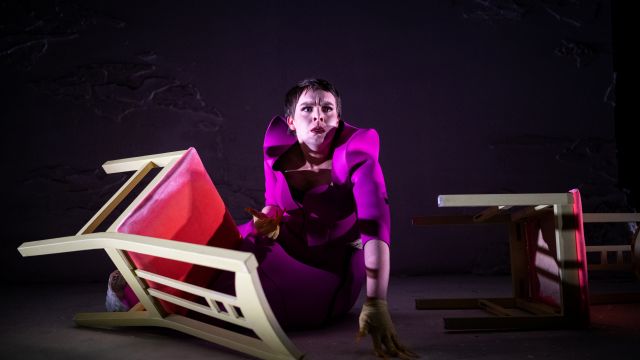Medea Out of the Mouths of Babes
Here is a gripping and profound reworking of Euripides’ ancient Greek tragedy. First performed in 431 BCE, the essence of its plot in this production is untouched: ‘a mother kills her children.’ Why? That is the question posed at the start and by the end of this skilfully stylised melodrama that question is unmistakeably answered.
It begins with an outrageous and unsettling parody of an info-tainment television show (think the recent movie Don’t Look Up but even more gratingly ridiculous) where the glamorous anchor team report on an horrific event – a mother has killed her children! - and ask how this could happen? They bring on a guest, clairvoyant Priestess Brioche to answer that question. As if. We are soon laughing at her; even the ‘journalists’ see through her.

Paradoxically, this trivialising throws into sharp relief its obverse: the horror of the murder of children by their own mother - and its cause. The presence of the fraudulent clairvoyant signals ‘don’t look there’; the answer to ‘why?’ will not involve the supernatural. The gods are absent this time. And then we plunge back into the past and Euripides’ telling of the story – or a version of it.
Stephen Mitchell Wright’s and his collaborators’ reworking of Euripides is guided by a focussed theatrical vision. They know why they are telling this story and how they will tell it. Nothing is arbitrary. If Jason’s new bride, Princess Glauce’s name is changed to ‘Tiffany’, there is a reason for it.

What is added to Euripides, what is omitted, and the modes of performance by the excellent cast of only three – Willow Sizer (Medea, Journalist La Femme), Emily Joy (Child 1, Princess Brioche, Nurse, King Creon) and Paolo Bartolomei (Child 2, Journalist 1, Princess Tiffany, Jason) – are all precisely judged, from high flown poetic declamation to acidic satire. As well, there is Hahnie Goldfinch’s minimal set and costume design, Ben Hughes’ and Spencer Herd’s lighting, Rachel Lewindon’s sound design, and Chris Bennett’s video interpolations projected above the action, again all are of a piece feeding into and sustaining a clear contemporary ‘take’ on this story. The ambivalent to-ing and fro-ing of the Chorus is stripped away.
It is a story that has survived two and a half thousand years – and has been told, retold, staged, restaged, adapted, and filmed. We can only think that an uneasy fascination with infanticide by a murderous mother endures through time and circumstance. Is it that such a murder is a ‘crime against nature’? A murder not committed out of madness, or in a delirium, or by accident, but in enraged revenge and (almost) cold blood. Is it a proto-feminist depiction of a woman betrayed and abandoned in a patriarchal society? Is it misogynist fear of such a woman? Is it the cliché, ‘Hell hath no fury like a woman scorned’? But it is all these things here, and Medea, we see and feel, is far more than ‘scorned’.

Perhaps what distinguishes this iteration most of all is the inclusion of the children’s point of view and their presence as characters on stage. Indeed, five children – a ‘Children’s Council’ – were included in the development of the work. In Euripides’ original, Medea’s two children – both boys – are occasionally on stage but mute until, off stage and moments before their death, they get two lines each. Here, they are characters - a real boy and a girl (played Bartolomei and Joy in pyjamas), playful, loving, naïve – and so the horror is seen and felt.
And then there are those with the power over Medea: Creon and Jason. Mitchell Wright does not depart from Euripides – indeed, it’s not necessary; it’s all there in the text. Euripides does not ‘excuse’ or justify Medea, but his sympathy for her is evident; perhaps that’s why the play was apparently not well received back in 431.

King Creon (played by Joy) is a fearful, bumbling but of course cruel king. Basically, Creon doesn’t want any trouble, and Jason has married his daughter, so too bad, Medea. Jason (played by Bartolomei) is a posturing popinjay, swishing his red cloak like a child playing dress-ups as he spouts his self-serving rationalisations for his betrayals. We see a ‘hero’ who could not possibly have won the Golden Fleece without Medea’s help – help, moreover that has left her a stranger in a strange land.
Mitchell Wright’s sure hand over every aspect of the production keeps us with Medea even when we recoil from her actions and leads us through to the chilling but inevitable finale. All along, we know what Medea will do. What we see here is what is promised in the whacko prologue: how and especially why. The audience is stunned and silent. We have catharsis. A most impressive achievement from all concerned.
Michael Brindley
P.S. And this show beats the Theatre Works acoustics: every word is clearly heard.
Photographer: Morgan Roberts
Subscribe to our E-Newsletter, buy our latest print edition or find a Performing Arts book at Book Nook.

